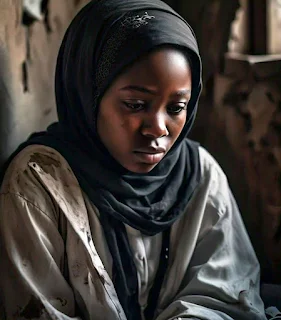(toc) #title= (Table of Content)
Summary
Habiba by Razinat T. Mohammed is a compelling narrative set in Northern Nigeria, focusing on the complex and often oppressive societal structures that shape the lives of women and girls. The story revolves around Saleh, a man whose love and respect for his mother, Hamsatu, lead him to make decisions that ultimately harm his own family. Hamsatu exerts immense control over Saleh, dictating significant aspects of his life, including whom he marries and how he raises his children.
Habiba, Saleh’s daughter, becomes the central victim of these oppressive decisions. At just thirteen, she is forced into marriage with Zubairu, an elderly man who was once a contemporary of her late grandfather. This marriage is a result of Saleh's financial desperation, which leaves him indebted to Zubairu. Unable to repay the loan, Saleh hands over his daughter in marriage, subjecting Habiba to a life of hardship.
The novel explores Habiba's struggle as she is not only forced to endure a marriage she never wanted but also to take on the burden of her father's abandoned responsibilities. Despite the oppressive circumstances, Habiba nurtures a desire for revenge against both her father and Zubairu, highlighting her internal conflict between familial duty and personal desire.
Themes
1. Patriarchy and Female Oppression: Habiba delves deeply into the theme of patriarchy, highlighting how societal norms in Northern Nigeria often place women in subjugated roles. Hamsatu's control over Saleh and Habiba's forced marriage illustrate the oppressive structures that govern the lives of women, limiting their autonomy and subjecting them to the whims of men and elder women in positions of power.
2. Intergenerational Conflict: The novel portrays the tensions between tradition and modernity, particularly through the relationships between Hamsatu, Saleh, and Habiba. While Saleh wishes to send his children to school, representing a more progressive outlook, Hamsatu’s adherence to traditional values results in decisions that are detrimental to her family's well-being. Habiba's story symbolizes the struggle of younger generations to break free from the constraints imposed by their elders.
3. Sacrifice and Survival: Habiba’s life is a testament to the sacrifices imposed on women in patriarchal societies. Her marriage to Zubairu represents the ultimate sacrifice—a loss of her childhood and personal aspirations for the survival of her family. The novel examines the harsh realities of survival for women in impoverished communities, where their fates are often dictated by economic desperation and societal expectations.
4. Resistance and Empowerment: Despite the oppressive circumstances, Habiba’s internal desire for revenge against those who have wronged her introduces the theme of resistance. Her struggle to find agency in a society that seeks to suppress her voice reflects broader issues of gender-based violence and the quest for empowerment among marginalized women.
5. Cultural and Social Critique: Through its narrative, Habiba critiques the socio-cultural practices that perpetuate the victimization of women. The novel challenges the acceptance of child marriage, the lack of educational opportunities for girls, and the economic dependencies that reinforce oppressive gender dynamics.
Habiba is not only an exploration of personal and familial strife but also a broader commentary on the systemic issues faced by women in Northern Nigerian society. Razinat T. Mohammed's narrative underscores the urgent need for social change, advocating for the rights and empowerment of women in a context where their voices are often silenced.

Leave a comment behind